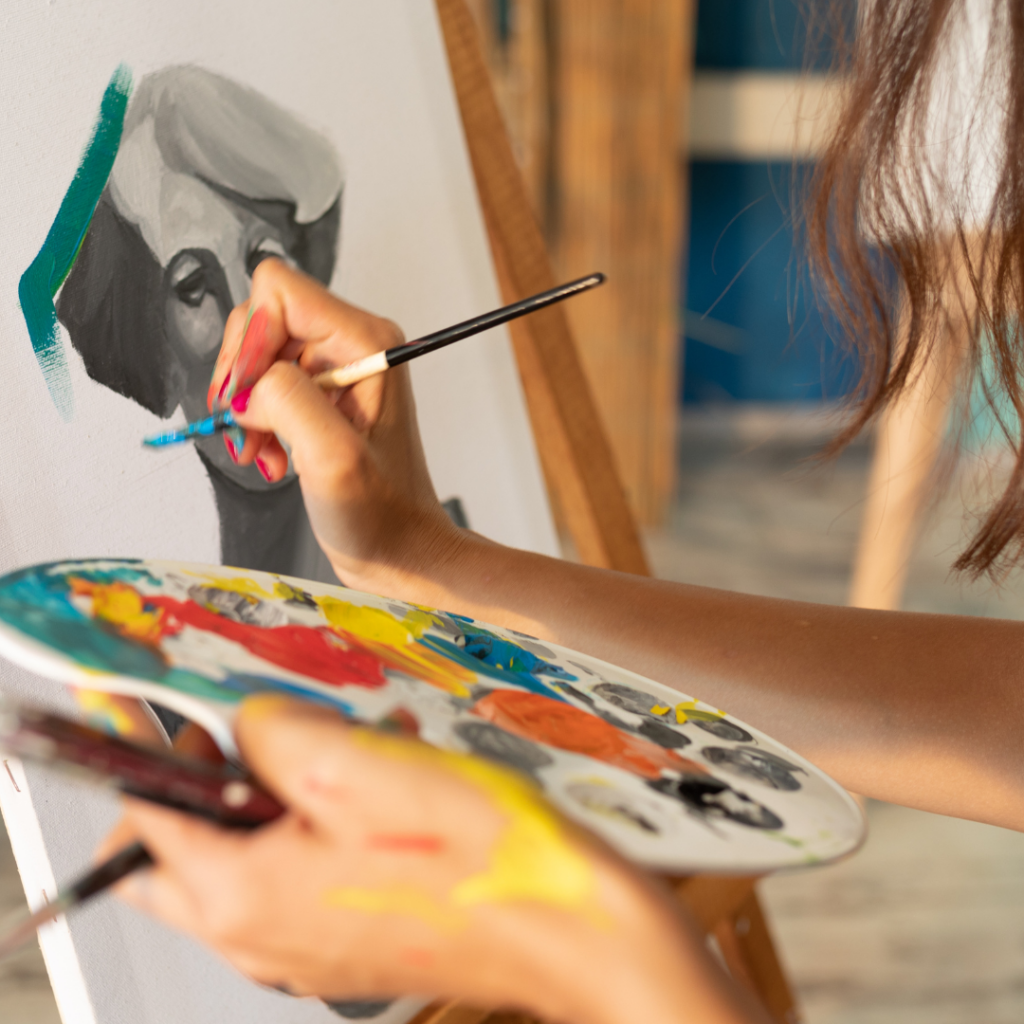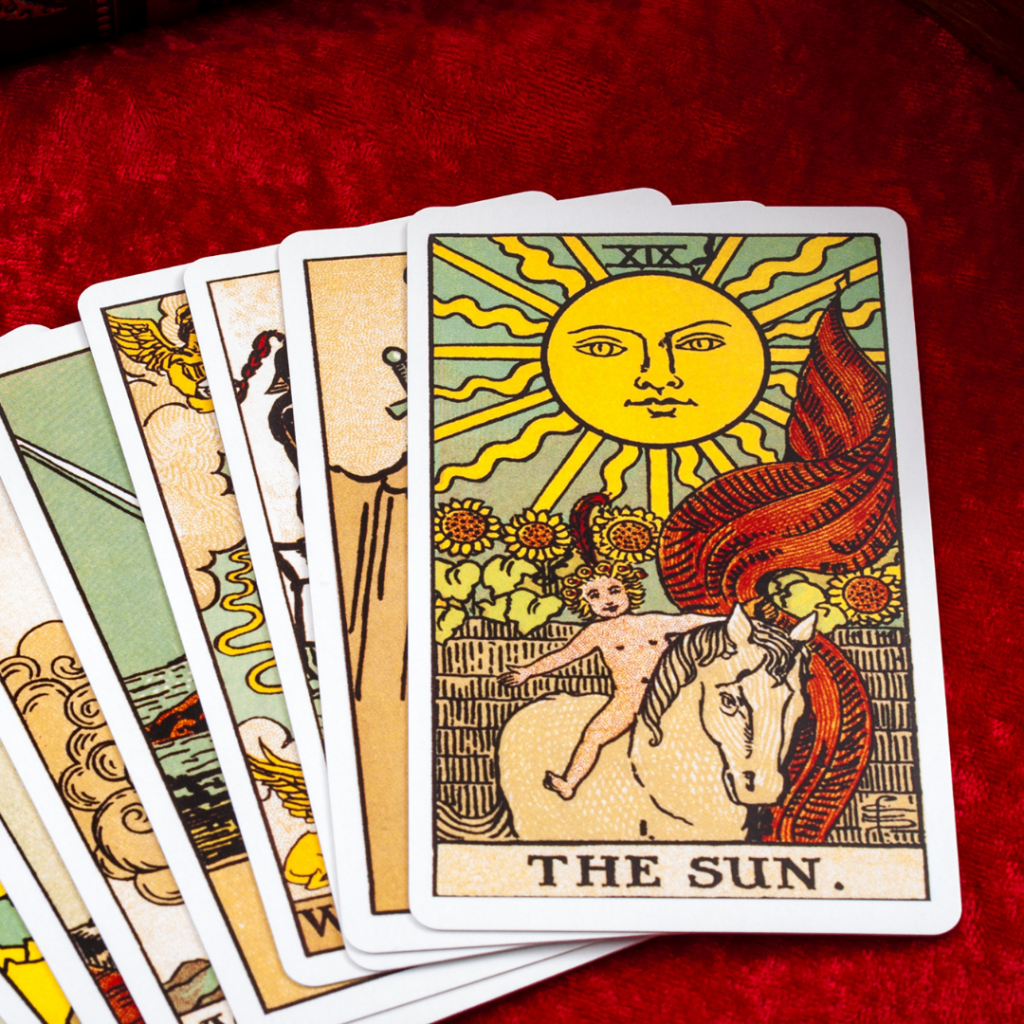Welcome to the heartbeat of Integrative Counsel, our blog where tranquility meets transformation. This is your sanctuary for insights and wisdom on nurturing a harmonious connection between mind, body, and spirit.
DIY Art Therapy For October 2024

How are we supposed to focus on art therapy when there is so much going on? The veil is thin. Summer is over. Hurricane season is in full swing. Halloween is creeping up around the corner and into the specialty sections of our supermarkets. Welcome to October.
Whether the moon is bright and beautiful or duskily lurking behind impenetrable cloud cover, this is the season to lick our wounds, learn the things we wish we didn’t have to, and uncover what is waiting in the shadows. As Halloween approaches, we’ll all be wearing a lot of masks both figurative and literal. This October, why not take this opportunity to unmask yourself and step into your authenticity?
“Monsters are real, and ghosts are real too. They live inside us, and sometimes, they win.” Stephen King
Playing Dress-Up as Art Therapy

When we dress up, we are not just putting on a costume. We are playing a role. What we bring to that role says just as much about ourselves as it does the role we intend to play. Our roleplaying can shine a light into our unconscious avenues of thinking that are otherwise challenging to access. Through the characters we play (and the way we play them), we can better understand ourselves.
Research has shown that roleplaying can have numerous benefits on our processing abilities and mental health. Many patients work through their personal feelings more easily through the lens of a character than they might otherwise. Even patients who were otherwise difficult to establish a therapeutic relationship with have found success in exploring their life experiences through roleplaying. It’s often easier to take a step back and analyze when we don’t have the baggage that comes along with analyzing ourselves.
So how do you use dress-up and roleplaying as an avenue for therapeutic growth? How do you mindfully pick out your costume? What questions should be on your mind as you explore this creative space?
- Pick An Insightful Character. When you’re going in for a job interview, one of the most common pieces of advice we hear is to dress for the job you want. What job are you going for with your character? Are they a caretaker? Are they a protector? Are they complicated? Are they based on people you’ve encountered in your life? By having involved answers to these questions, you can pick a character that is meaningful to you and where you’re at in your life.
- Don’t Bother Buying A Costume From The Halloween Store. Purchasing a pre-made costume removes some of the therapeutic value from this experience. The character that you will be embodying wears clothes you already have in your closet or dresser drawer, and you must be the one to distinctly pick them out. All art therapy requires boundaries, and I think this is a very reasonable one for this assignment.
- Why Does My Character Dress This Way? We wear the things we wear for a reason. Going back to the metaphor of the job interview: What job is your character going for, and what does that say about them? What are they wearing because of how they’d like to be perceived? What are they wearing for sentimental value? How much of their style is an affect? How much of their style reflects their internal world?
Exploring The Subconscious Through Art Therapy

One of my favorite benefits of art therapy is the window it gives us into our own subconscious. When we draw a tree, we don’t just learn how able we are to draw leaves and branches. We learn what it is we think of when we think of a tree. Through art therapy, you can identify and question the assumptions you make about the world around you. So what should we draw?
- A Family. Draw a family with parents, children, pets, a house, and whatever else should be included within a family. However, for each family member that you add, make sure to include a little word bubble that says how they feel. How is this family similar to your own? How would this family interact with one another? Is there something missing from this family? Is there something that this family has that you wish your family had?
- Someone Standing In The Rain. Draw a person who is standing outside in the rain. Is it a gentle drizzle or a full-on thunderstorm? What are they wearing? What do they have in their hands? Are they prepared to get wet? How do they feel about being out in the rain?
- A Monster. Draw a creature that you are afraid of. What makes them scary? What makes them powerful? How do they defend themselves? What are they similar to? What is their weakness? How are they different from you? How are they similar to you? What would you have to learn in order to face this monster?
“The call is coming from inside the house.” “The Babysitter and the Man Upstairs”
Connect With Your Ancestors Through Tarot Reading

We are inevitably impacted by our families of origin. Whether they were your biological parents, or anyone else who might have raised you, their parenting style was heavily influenced by the people who parented them (AKA: your ancestors). Oftentimes, most of these ancestors are only with us in spirit, so to find resolution with our family stories we must rely on our spirituality (AKA: your most deeply held beliefs). One of the most therapeutic and deeply personal ways to connect with your spirituality is through the act of interpreting tarot.
You might say: “Tarot is not art therapy, tarot is magic.”
And you’d be right. But I consider magic and art therapy to be adjacent practices. The things we learn from tarot are magical, mystical, and ultimately random. But the way that we interpret that information is a profoundly creative and artistic act. And through the act of creation, we can find unique insight into ourselves and the way we perceive the world around us.
So whether you’re dusting off grandma’s tarot deck that’s been sitting in the broom closet, opening an app on your phone, or pulling your favorite deck from off the altar, these questions and prompts should help to put you in touch with your ancestors and the way your family has been raised.
- What Family Stories Need To Be Healed? As you shuffle your deck and draw your cards, think about the things you have in common with your ancestors. What are the stories that have been handed down from parent to child? How have you echoed those stories in your own life? What ought to be rewritten in that story? What is worth preserving for the future?
- What Trauma Has Been Passed Down In My Family? This question is to help you explore how your parents and ancestors were raised and formed by their surroundings. What were the formative negative events in your family? What aspects of your parents’ upbringing led them in the wrong direction? What aspects of your own upbringing left you hurt, underprepared, or neglected? How can you let go of your ancestor’s trauma? How can you process your own?
- How Can I Make My Ancestors Proud? We all have an intense desire to be accepted by our families. Sometimes that isn’t the best option with our family of origin, but we can always come to peace with our ancestors. What aspects of our ancestors live on in us? What have we been able to overcome that they couldn’t or wouldn’t? What can we do to honor their legacy? How have we already honored that legacy?
“What can you do in therapy to work through generational trauma? First, understanding your nervous system, how to regulate and get a relaxed muscle body so that you can really start peeling back the layers of how you were impacted by the trauma, how it’s showing up in your relational or vocational dynamics with your family and start to work through that. Second, also understanding that the generations that came before you were just flawed humans doing the best they could with what they had to work with.” Lauren Mishkin
Face Your Fears With Scary Stories
In our lives, it is inevitable that we encounter that which we fear. We don’t have to like it. We don’t have to seek it out. We don’t have to stop being afraid of it. But sometimes we do have to accept it.
Facing your fear can be a daunting task. Especially if you have vulnerability factors like post-traumatic stress from a prior encounter with it. Although it is necessary to face your fears, you don’t have to be unprepared.
Our fears can approach at inopportune times, but with the right tools in hand, you can take your resilience into your own hands.
- Set Intentions Beforehand. Know what you want to get out of the next encounter with the thing you fear. Whether you accomplish these intentions or not, they’ll be the destination you find your directions to.
- Cope With Anxiety In The Moment. If you have a strong toolkit of self-soothing activities to cope with your anxiety, then you can cope your way through your fear instead of being paralyzed by it. So much of our overwhelm comes from unmanaged anxiety, and the only time you can ever really start to cope with it is the present moment.
- Embrace The Unknown. We fear that which we do not know. It doesn’t always serve us. It doesn’t always make sense. It doesn’t have to. Human beings are mostly diurnal creatures that live in the sunlight and fear the darkness. But if we cover in fear of the unknown, we might be so busy panicking over the darkness that we don’t see the crackling campfire right in front of us.
- Get Knocked Down, But Get Back Up Again. There will be times when fear overwhelms us. We are not perfect, nor is anyone else. We can’t control what’s in the past. In truth, we can control precious little about the present. But we always have power over ourselves. We cannot control when fear will rise up in us, but we can always make the decision to be brave.
“Never to suffer would never to have been blessed.” Edgar Allen Poe
Sign up to receive our virtual magazine in your inbox! We send free resources, art and journal prompts, wisdom from our practitioners, and more. Click here to get on the mailing list.
Sunny Ebsary is an educator, multi-modal artist, and writer specializing in the intersection of myth and mental health. Sunny’s writing walks the line between poetic and logical, giving readers a chance to interface with the mind and imagination. Sunny’s been putting pen to paper since he was a child, writing everything from albums, novels, and plays, to essays, interactive games, and of course, many articles! While studying both psychology and writing, he realized his real passion in life was helping others unlock their creative spark. Whether he’s leading a D&D game, directing a production, or diving deep into the brain, you can be sure Sunny will be ushering you toward finding meaning in your life.
October 3, 2024
Click here to book a consultation call and start navigating your personal path to mental harmony with a therapist who gets you. Your journey, your pace, your story—let's unfold it together.
Let's keep the conversation going.
Feeling the spark to light up your wellness journey?
resources
CONTACT
RATES
join us
shop
SERVICES
OUR APPROACH
visiting professionals
OUR TEAM
HOME
727.342.0054
hello@integrativecounsel.com
Integrative Counsel is committed to providing culturally competent services. We respect the uniqueness of every person including, but not limited to race, ethnicity, gender identity, sexual orientation, class and religious affiliation.
